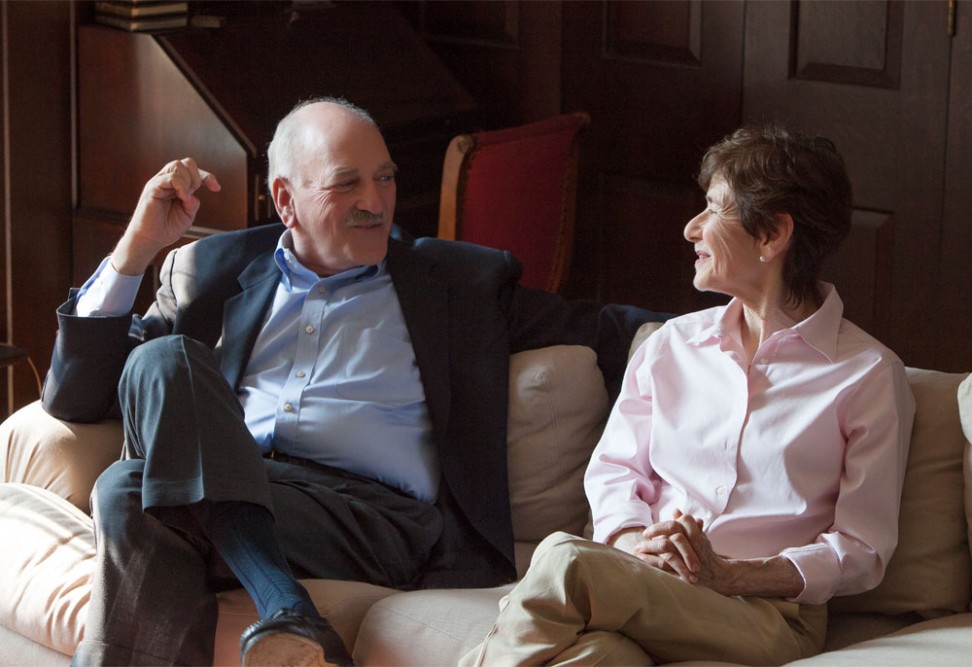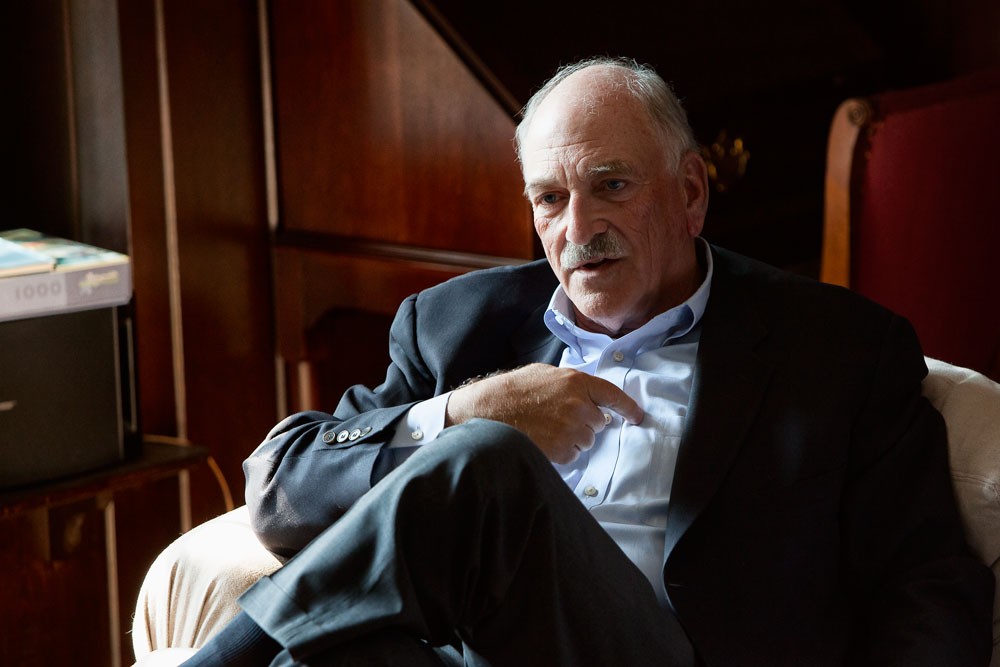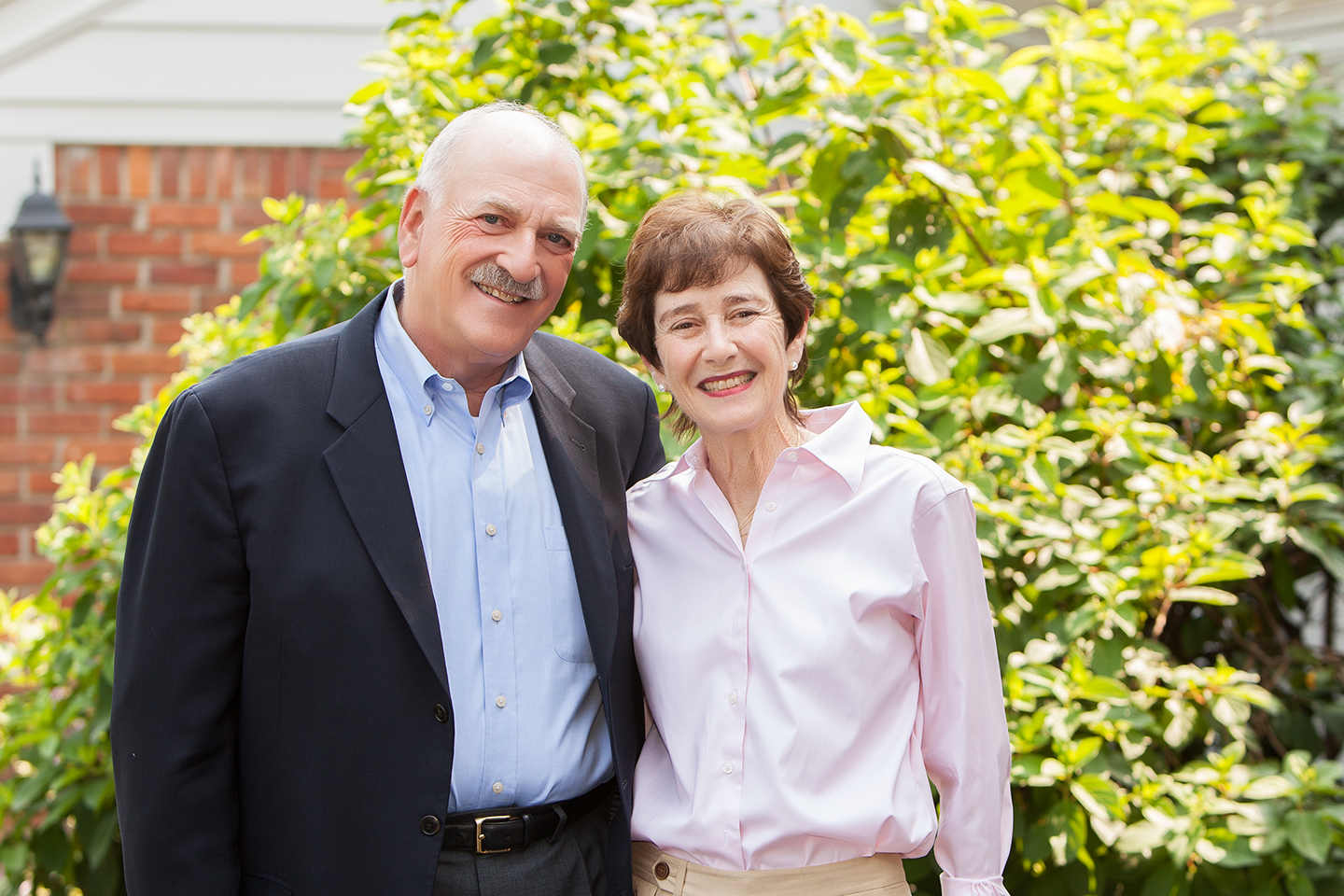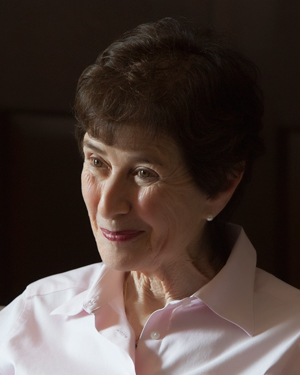Honored Community Leaders
By Vivian Henoch, Editor myJewishDetroit
September 1, 2014
Ask Sally and Richard Krugel and they’ll tell you that when it comes to community activity, “no” is not a word in their vocabulary. Passionate about all things Jewish, together, and each in their own professional and volunteer roles, Sally and Richard share a long history of contributions to the vitality and well-being of the community on both the local and national scale.
An orthopedic surgeon in practice in the Detroit area since 1976, Richard Krugel, M.D., now joins the roster of recipients of the Fred M. Butzel Award, the Detroit Federation’s highest honor bestowed upon its leaders. Chair of The Jewish Fund and most recently stepping into the role of President of the Jewish Community Relations Council (JCRC), Richard has served many years on the boards and in leadership positions with Federation, locally and nationally, its partner agencies and other community organizations including Fresh Air Society/Tamarack Camps, JCC, Jewish Home for the Aged (now Jewish Senior Life), Sinai Hospital, American Friends of Alyn Hospital and JESNA (Jewish Education Services of North America).

A skilled fundraiser, trusted advisor and mentor, matching Richard’s wide range of civic and organizational activities, Sally Krugel served Federation in numerous advisory and volunteer capacities before joining the staff, first as Director of the Women’s Division (now Women’s Philanthropy) and later as Director of Federation’s 2004 Miracle Mission 4. Previous to her second stint with Federation, she was Development Director of Kadima. Other organizations where Sally has remained active over the years include Yad Ezra, JCRC, Maccabi and the Jewish Hospice and Chaplaincy Network, where she recently joined the staff as director of administration. She has also been active at Congregation Shaarey Zedek including Chair of Synagogue 2000 and leadership of the Shabbat Lunch program.
When the Krugels speak of people and places that have deeply influenced them and of pivotal moments in the course of their long, happy marriage, invariably they bring up the topic of Israel. Since their first trip to Israel in a Young Leadership delegation from Detroit on a National Mission in 1976, Sally and Richard have visited Israel more times than they can count, both as mission participants and leaders. These days, as their circle of Israeli friends and family continues to expand, they find themselves visiting Israel at least once a year.
In celebration of their 50th wedding anniversary in December, Sally and Richard plan a family trip to Israel. Parents of Joel and Heidi, Howard and Erin, Noah and Ellen (all of whom have remained residents of Metro Detroit), the Krugels’ very favorite roles to date are Savta and Saba to grandchildren Darby, Cami, Sloane, Orley, Jesse and Adam.
Still going strong and full speed ahead, now in their 70’s, both Richard and Sally have set the bar for Detroit’s NEXTGen. In our interview, we catch the Krugels at leisure after a busy day . . . in a rare opportunity to reminisce and share.
On early years and influences
Sally: Richard is a Detroiter. I grew up in Flint, in a very traditional Jewish home, and went to high school in Bay City. My mom was always involved with the shul in the community itself, always a chair of this and that. It was a very important value in our home. I have come to treasure the family story about my father during the’67 war in Israel: it was a time when many people who were fortunate enough pledged certain amounts for the special campaigns. My father even took out a loan to support Israel.
Richard: It never ceases to amaze me how connected we are and how so many good things in our life somehow have come from our Jewish connections. I like to talk about Jewish journeys, and I think that Sally and I have had the opportunity to share a journey filled with discovery and adventure all the way.
myJewishDetroit: How did you meet?
R: We met in Ann Arbor in our freshman year. A mutual friend whom I knew from Tamarack fixed us up.
myJewishDetroit: And after Ann Arbor, you left Michigan for a while. Tell us about that experience.
S: I believe that living in different regions of the country really has strengthened our marriage and broadened our experience. As a young couple, we lived in Brooklyn for three years during Richard’s residency at Maimonides Medical Center and Brooklyn Jewish Hospital. After that, we moved to Montgomery, Alabama, where Richard served in the U.S. Air Force.
In Alabama, we found a very welcoming Jewish community. I remember vividly – it was sometime during the Yom Kippur War ’73 and we went to a community meeting one night when they announced pledges from the audience. That was an eye-opener for us, the first time we ever heard of such a thing— they were big pledges of course.
R: Another standout experience for us in Alabama was the opportunity in 1974 to spend a year with an officer from the Israeli Air Force, Avihu Ben Nun – the first IDF officer ever to be invited to the American Air War College. (Avihu would rise in the ranks to become the 11th Commander of the Israeli Air Force between 1987-92). But, at the time when Sally and I lived on the same base with him, we developed a wonderful relationship with Avihu, his wife, Ariella, and his children. At the end of our tour of duty, as we were both returning home, he asked us in the most emphatic way, “When are you coming to Israel?” We were a young family, headed back to Detroit with three small boys, and honestly it had never occurred to us to go to Israel.
On first missions to Israel
S: I always figured a trip to Israel would be something we would do for our 25th anniversary.
R: Well, maybe Sally thought about it, but I put it out of my mind as we set off to Detroit to establish our home in Southfield. But it wasn’t long after that when a friend of ours asked us to a recruitment meeting for a Young Leadership Mission and that’s how I linked up again with Larry Jackier. Larry and I had been friends in high school and we had spent a summer at Fresh Air together. (I find it interesting how everything connects and comes back to Federation!) I didn’t know anything about Federation, but when said, “Come with us, we thought again of our dear friend Avihu, and set off with the Federation on a mission in 1976.” They called it “This Year in Jerusalem” and it was a trip that would change our lives.
I’ll never forget the first day of that trip . . flying out of New York on this big white bird with a Jewish flag on its tail.
We flew first to Vienna. There had been some incidence with El Al around that time, so we were not allowed into the airport. So there we were: detained on a plane, sitting on the tarmac, surrounded by Army vehicles. A very strange feeling. Officially we were not in the country. They took our passports, then put us on buses and transported 400 of us to the countryside to Mauthausen-Gusen, to visit the concentration camp, which historically was one of the first “death camps” preceding Auschwitz.
Mauthausen is a very interesting place to visit these days, but beside everything, it still has gas chambers. . . So what do you suppose they did to us upon our arrival? They packed 100 of us into a gas chamber and slammed the door. You look up see the shower heads and you’re thrown back to that moment in history to visualize what would happen next. They opened the doors of course, we came out into daylight and into a profoundly moving ceremony. But the impact of that experience — all packed into a 24-hour period — literally changed me, because it made me understand what being Jewish was.
S: And when we returned to our seats in the back of the plane, it just so happened that there were about a dozen vacant seats which they filled with people who had been awaiting passage to Israel from the Soviet Union. So there we were – in another moment in history — flying to Israel with these Soviet olim (immigrants), and not a dry eye among us in the back of the plane. There were a few people on both sides who could speak Hebrew, and a few who could speak a little Yiddish, but we all knew some songs to sing.
R: That’s beauty of the Jewish world.
On leadership development
myJD: Not many couples have the distinction of winning both the Frank A.Wetsman and the Sylvia Simon Greenberg Awards for Young Leadership. Who were your mentors?
S: It wasn’t a person, but the Wexner Heritage Program, which we both went through. Billionaire retailer and philanthropist, Les Wexner, of Columbus, started this program because he felt that anyone involved in taking Jewish leadership roles should have a basic Jewish knowledge to make decisions for the community. So he created the program, starting with models in Columbus, Detroit, Milwaukee, Minneapolis and Pittsburgh and a commitment to bring in top scholars and leaders from around the country and from Israel. For two years, we would sit down for four-hour sessions on Monday nights every other week and learn Jewish principles from the best and brightest thinkers.
R: A highlight for me was a retreat in Aspen where we sat at dinner with Leon Uris, one of my very favorite authors. He had just written The Haj, and there we were, discussing the book with him over a meal. It was a real thrill for us.
S: To this day we still study. . . now with Partners in Torah at Yeshiva Beth Yehuda.
myJD: PASTGen, PRESENTGen NEXTGen… you’ve been leaders on the forefront of many developments in the community. In what ways would you still like to see Federation change?
R: First, let me say that I’m all for what NEXTGen is doing. I grew up in Detroit in its heyday, when it was a wonderful booming city. It is very exciting to see the creativity and energy NEXTGen is bringing to revitalize our city.
S: And, the initiatives we see at Federation and other agencies are just a sampling of what’s going on that’s great here in Detroit. Most people don’t get the luxury of traveling around the country, hearing the raves. Richard sits on a national board, and when Detroit talks, people listen. They want to know what we’re doing.
R: I do think we still need to develop new leaders in pivotal roles. We “old-timers” are not going away, but we need to pass the baton. We have knowledge, we have history, but we no longer need to be the officers of our boards and chairs of our activities.
(Of course, I say that having just taken the presidency of the JCRC. But that was a position I was asked to fill because of my involvement over the past year in formulating the new strategic plan. I look forward to seeing that work come to fruition.)
On achievements
myJD: What are your proudest moments?
R: Currently? Winning the Butzel. I would have felt honored just to know that I was even considered. But having been chosen by the community this year is so meaningful to me, because it shows that you can be recognized for a lifetime of effort and work for the community and Clal Yisroel. In truth, the work is reward enough.

S: Richard and I were honored in 2012 by Yad Ezra, and to me that was very gratifying. I’m also particularly proud of my work on Federation’s Miracle Mission. The timing was really challenging – right at the end of the intifada in 2004. We had 600 people originally signed up — and many dropped off, and then we had another 600 people sign up before we left – in an incredible show of solidarity. To me, it was a miracle just to see those El Al planes landing in Detroit, ready to take us non-stop to Israel. That trip was wonderful experience and really a highlight for me.
But all things considered, when we look back to all that we’ve done and the experiences we’ve had, we can honestly say we’ve been enriched by our community life. It has added an immeasurable dynamic to our experience and given us back one-hundredfold to what we’ve given.
Favorites
Restaurant: R: We like Marios, but we don’t eat out that often because Sally is a great cook. S: We have Shabbat dinner here almost every Friday and we’ve been doing that since our kids were very little.
Place to meet for coffee: Starbucks
View in the Detroit skyline: S: I love the view coming into town on 1-75, when you see St. Joseph’s Church steeple against the backdrop of the RenCen. R: That’s the church I passed every day going to DMC’s Receiving Hospital.
Place to take kids: S: Depends on the age of the kids, but we like everything from the Robot Garage to the Detroit Institute of Arts to the Detroit Historical Museum. If it’s a place for kids, we‘ve hit it. R: When I was a kid, the Historical Museum was one of my favorite places to go. I also have fond memories of the downtown library, where I spent much of my time writing reports in high school.
Vacation spot in Michigan: R: Up north, my sister lives in Wolverine, MI., 27 miles south of the Mackinac Bridge. We get two benefits from this, I get credit for being a good brother and we get to see a beautiful part of our state.
Favorite spot in Israel: S: There’s always something new to see, but now we mostly go to visit friends. R: I like Tel Aviv and Herzliya and Sally likes Jerusalem. S: So we can’t make aliyah, because we can’t decide where to live. R: But maybe someday, as I wind down my practice, and have time to be someplace, that someplace will be Israel.
Sport: R: All sports, but I play golf. S: We’re BIG Michigan fans.
Jewish food: S: Challah. I love to bake challah, a habit that started in Alabama because we didn’t have a Jewish bakery. Now it’s something of a family tradition; I’ve taught all my granddaughters how to bake challi.
Jewish expression: S: Oy-va-voy! That’s extra emphatic Israeli slang for Oy. And mamash— Hebrew for Really?
R: My favorite word is plain and simple: Chutzpah.
Reading now
R: Act of War, a new thriller by Brad Thor. David Baldacci is another favorite author.
S: Americanah, by Chimamanda Ngozi Adichie.





